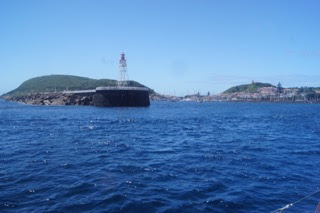Here is the summary of our passage from St George in Bermuda to Horta in the Azores. It was a challenging passage, mainly because of the frequent fronts we experienced in the last half of the passage.
First the usual plots…
Zen Again Track
Zen Again Speed
Our one navigation error was the zig north at the 60% point. The proof is that we were reeling in sv La Luna at 10 miles / day until then, and we lost 50nm to them in a single day! The following day we "put our foot down" and caught them again.
The speed plot shows that the first few days were very variable speed-wise. Nice sailing for a day and then lighter airs, sometimes remedied by motoring. Later the slow patches are mostly due to taking it easy during the passage of cold fronts - not wanting to be ambushed by squalls. If we had radar we'd see them coming but without it we're sitting ducks when it's overcast.
Here are the vital stats for the passge…
• Distances/Speeds
• Route Distance = 1800nm
• Logged Distance = 2046nm (including extra 30nm for impeller issues)
• GPS Distance = 1914nm
• Duration = 16 days
• Average boat speed = 5.3kt
• Average VMG = 5.0kt
• Average day's run = 128nm
• Best day's run = 151nm (6.3kt)
• Minimum boat speed = 3 kt
• Maximum boat speed = 10 kt
• Weather
• Minimum wind speed = 2 kt
• Average wind speed = 22 knots
• Maximum wind speed = 40kt+ (in a squall)
• Apparent wind angle range = 80 to 160
• Seas up to 3m
• Swell up to 4m
• Usually cloudy, frequently overcast
• Engine
• Total = 40 hours
• Driving = 30 hours
• Charging = 10 hours
• Consumption
• Water =120 litres (7.5 litres / day)
• Fuel = 60 litres
• Failures
• Gas sensor (following submersion after a wave came below via the companionway)
• Locknut holding tiller to rudder loosened but did not fail
• Stars
• The boat!
• Aries vane gear (steered 60% of passage)
• Pelagic Autopilot ram (steered 40% of passage)
• Dodger by Debbie at Fremantle Ocean Canvas
• Icom HF/SSB radio with SSB Minder
• PredictWind Offshore app (over Iridium GO!) for obtaining GRIBs and routing recommendations
• qtVlm GRIB viewer and weather-routing software
Faial in the sunrise
Entering Horta harbour
It's interesting that we appear to have had about 130nm of current assistance. We did work to stay in the current predicted by RTOFS but hadn't anticipated quite than amount of gain. We certainly appear to have managed to stay out of adverse current apart from along the S coast of Faial.
Four significant low pressure systems affected our passage, all passing to our north. The first originated in Newfoundland while the others were from the Gulf of Mexico. The first three produced cold fronts which swept over us with winds up to 35 knots. The strongest wind we experienced was in a squall which followed the third front. All fronts produced steady rain which started as drizzle and gradually increased. We only had heavy rain in squalls and isolated storms following frontal passage.
We sailed through the fronts under either deeply furled yankee or staysail with no main. In the squall we were under bare poles and doing 7+ knots running. We adopted this strategy since the wind was taking us in the right direction and we had plenty of sea room.
Each low pressure systems kicked up a substantial swell. Often these were across the wind by the time they reached us, producing some very rolly conditions and sometimes a very confused, breaking sea. It's fascinating watching multiple wavetrains fight it out, sometimes shooting geysers of water vertically into the air when they meet. Not so fascinating when they do so on top of you! On a couple of occasions we changed course from a beam reach to a broad reach due to the risk of knockdown by the breaking waves.
It was interesting how well our solar panels functioned on this passage. Although there was a lot of cloud it was often fairly thin and the panels delivered 5-8 amps. In full sun we get 15 amps (more if the batteries are really low). The long days also appeared to assist the panels.
Once more we ate very well during the passage. Nic baked fresh bread rolls every few days. Our fresh food from Bermuda lasted well.
The word which seems to summarise this passage is "tiring". One front after another wears one down - even when they're not particularly strong - as does rolly conditions. The North Atlantic lived up (down?) to its reputation.
We're pleased to be in the Azores. Although technically part of Europe it doesn't feel like we're "in Europe", any more than it did in Reunion for example. Our next leg should finish the job!




Congrats! Have been following your progress. Glad you made it safely. Ally & Wayne
ReplyDelete